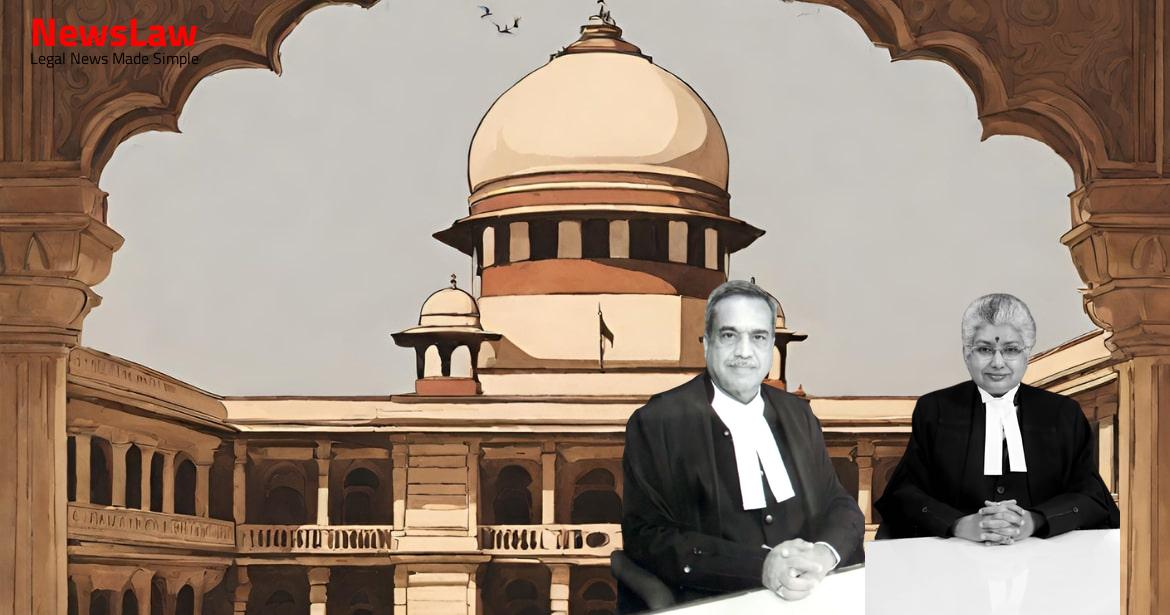Delve into the recent Supreme Court ruling regarding the establishment status in the case of BCCL Mumbai versus RPFC. This case revolves around the applicability of Section 25E(iii) of the Industrial Disputes Act, emphasizing factors like unity of ownership, management, and functional integrality. Discover how trade unions and welfare economics influenced the introduction of employee benefit schemes, leading to a detailed analysis on the unity of finance and employment. The judgment sheds light on critical aspects of labor laws and establishment relationships in a corporate setting.
Facts
- Welfare economics, enlightened self-interest, and trade unions influenced larger factories to introduce employee benefit schemes like provident funds.
- Pressure from trade unions played a role in the introduction of employee schemes.
- Schemes like provident funds were established for the benefit of employees.
- Larger factories and establishments implemented employee welfare schemes for their workers.
Also Read: Supreme Court Judgment on Single Till Mechanism for HRAB Calculation: A Comprehensive Analysis
Arguments
- The argument of the petitioner was based on the business model of outsourcing.
- The petitioner emphasized the unity of ownership, management, and control between TPHL and BCCL, Mumbai.
- The petitioner highlighted the agreement which provided for space and staff to be made available by TPHL for the benefit of BCCL, Mumbai.
- The petitioner argued that each establishment needed to be connected to BCCL, Mumbai, and not BCCL, Jaipur.
- The petitioner contended that the RPFC order confused the facts relating to the three establishments.
- The petitioner disagreed with the comparison to the business model of outsourcing due to the historical context of outsourcing during the time period under consideration.
- The petitioner claimed that TPHL essentially handed over its office space, employees, and control to BCCL, Mumbai under the agreement in question.
- The petitioner raised concerns about the improper segregation of the two companies for various labor law implications.
- The petitioner pointed out the usage of BCCL, Mumbai’s letter pads by TPHL executives for issuing documents.
- The petitioner argued that maintaining separate registrations, directors, shareholders, and financial aspects does not negate the functional integrality between TPHL and BCCL, Mumbai.
- Both the learned single Judge and the Division Bench of the High Court rejected the petitions without considering the relevant facts, which should have been looked into.
- The contention is that the definition of ‘establishment’ was not provided under the relevant Act, leading to the resorting of provisions of the ID Act.
- Learned senior counsel emphasized the need to consider the lack of defined ‘establishment’ under the Act, prompting the reference to the ID Act for clarity.
Analysis
- The case dealt with the applicability of Section 25E(iii) of the Industrial Disputes Act.
- Various tests were discussed to determine whether two units form part of the same establishment.
- Tests included unity of ownership, management, control, finance, labor, and functional integrality.
- The establishment in question was linked by functional integrality to be part of the same parent establishment.
- Court mentioned that the unity of ownership, management, and control are important tests.
- The functional integrality test was emphasized in this judgment.
- An agreement between BCCL, Mumbai and SVPL for printing newspapers was a focal point of discussion.
- The absence of exclusivity of dealing was noted in the agreement.
- Unity of finance and employment were also considered in the analysis.
- The nature of communication and common objectives of the entities were taken into account.
- The importance of functional integrality and unity of purpose in determining establishment status was reiterated.
- The Employees’ Provident Funds and Miscellaneous Provisions Act, 1952 (the said Act) was enacted to provide security to workers in organized industries.
- New establishments were initially exempt from the said Act for five years to prevent hardship.
- The period of exemption was later reduced to three years in 1988.
- On 22.9.1997, the exemption provision was completely removed for new establishments.
- Section 2A of the said Act clarifies that an establishment includes all its departments and branches.
- A change in location does not constitute a new establishment for exemption purposes.
- In Dharamsi Morarji case, the appellant company was running a factory manufacturing fertilizers at Ambarnath in District Thane, Maharashtra since 1921.
- Reference was made to judgments in Associated Cement Companies Limited and Management of Pratap Press, New Delhi for the purpose of determining the units of the same establishment.
- The employer’s defense in Raj’s Continental Export was considered regarding the claim for lay-off compensation by workers, where separate entities had distinct registration under various laws and separate employees.
- The tests for determining ‘one establishment’ in the ordinary industrial or business sense were derived from the Associated Cement Companies Limited case.
- The appellants are receiving lenient treatment regarding their liability, to be determined.
- Liability would only double over a period of more than thirty years.
- The matter has been prolonged for many years, leaving only the option for RPFC to impose damages under Section 14B of the Act.
- Originally, damages were limited to twice the original amount, but a subsequent legislative amendment introduced interest at 12% per annum from 1.7.1997 onwards.
- The amendment for interest application is deemed prospective.
Also Read: Selection and Appointment of Judicial Officers in Himachal Pradesh
Decision
- BCCL, Jaipur was not involved in the case, so their appeal was dismissed with a cost of Rs. 50,000/-
- The other two appellants were imposed costs of Rs. 20,000/- each, and their liability extended to be co-extensive with BCCL, Mumbai
- Costs were imposed on all three appellants, but in varying amounts
Case Title: M/S SHREE VISHAL PRINTERS LTD. ETC. ETC. Vs. REGIONAL PROVIDENT FUND COMMISSIONER
Case Number: C.A. No.-004474-004474 / 2010



